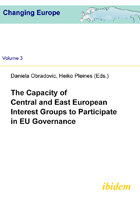Kolloquiumsvortrag
18:15 Uhr, / Zoom
Benjamin Goossen (Boston)
Mennonites and Lebensraum. Situating a Christian Denomination in Hitlers Empire.
Wissenswertes
Heiko Pleines, Daniela Obradovic (eds.):

The Capacity of Central and East European Interest Groups to Participate in EU Governance
ibidem-Verlag, Stuttgart 2007, ISBN 978-3-89821-750-7, ISSN 1863-8716
The integration of ten Central and East European countries (CEEC) into the EU as part of the 2004 and 2007 enlargements poses new challenges to EU governance, as the number of countries involved has thereby increased dramatically. However, the actors coming from the new member states also face challenges as they attempt to integrate themselves into EU decisionmaking processes. This book analyses the attempts of of civil society organisations from the Czech Republic and Poland to engage in EU governance in four policy fields. The guiding question is whether civil society organisations from the Central and East European member states have (or can gain) the capacity for meaningful participation in EU governance. After an introductory part, which outlines the analytical framework and offers a review of the literature, the actors and rules of EU governance are profiled. The third and fourth parts of the book then present case studies. The case studies address the civil society organisations most actively involved in EU governance, namely typical NGOs, trade unions, employers' organisations and business associations.

The Capacity of Central and East European Interest Groups to Participate in EU Governance
ibidem-Verlag, Stuttgart 2007, ISBN 978-3-89821-750-7, ISSN 1863-8716
The integration of ten Central and East European countries (CEEC) into the EU as part of the 2004 and 2007 enlargements poses new challenges to EU governance, as the number of countries involved has thereby increased dramatically. However, the actors coming from the new member states also face challenges as they attempt to integrate themselves into EU decisionmaking processes. This book analyses the attempts of of civil society organisations from the Czech Republic and Poland to engage in EU governance in four policy fields. The guiding question is whether civil society organisations from the Central and East European member states have (or can gain) the capacity for meaningful participation in EU governance. After an introductory part, which outlines the analytical framework and offers a review of the literature, the actors and rules of EU governance are profiled. The third and fourth parts of the book then present case studies. The case studies address the civil society organisations most actively involved in EU governance, namely typical NGOs, trade unions, employers' organisations and business associations.
Länder-Analysen
Die Länder-Analysen bieten regelmäßig kompetente Einschätzungen aktueller politischer, wirtschaftlicher, sozialer und kultureller Entwicklungen in Mittel- und Osteuropa sowie Zentralasien. Alle Länder-Analysen können kostenlos abonniert werden und sind online archiviert.
» Länder-Analysen
» Eastern Europe - Analytical Digests
» Länder-Analysen
» Eastern Europe - Analytical Digests
Discuss Data
Archiving, sharing and discussing research data on Eastern Europe, South Caucasus and Central AsiaOnline-Dossiers zu
» Erdgashandel
» Hier spricht das Archiv
» Russian street art against war
» Dissens in der UdSSR
» Duma-Debatten
» 20 Jahre Putin
» Protest in Russland
» Annexion der Krim
» sowjetischem Truppenabzug aus der DDR
» Mauerfall 1989

